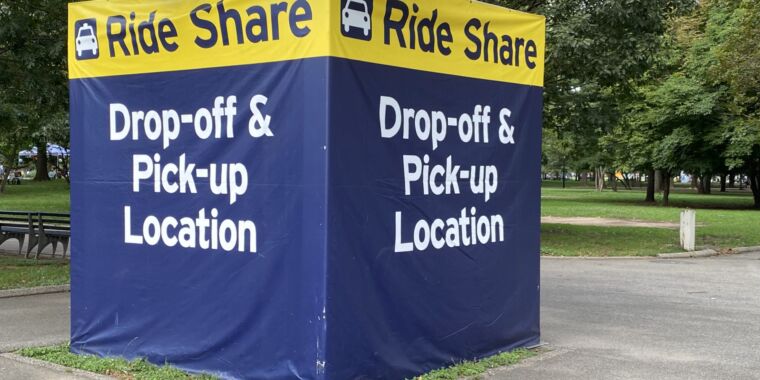
This week, Mozilla CEO Mitchell Baker rose as a key figure in Google’s defense against the Justice Department’s monopoly claims. Providing a video deposition for the landmark trial, Baker testified that Mozilla’s popular browser Firefox tried to switch from using Google as a default search engine but reverted back after a “failed” bet on Yahoo made it clear that Google was Firefox users’ preferred search engine.
According to Bloomberg, Mozilla’s temporary switch to Yahoo is “the only situation in which a browser has switched the default search engine provider.” This makes Baker’s testimony potentially very powerful because it’s a clear example that backs up Google’s core argument that its search engine wins default status due to its quality, not due to anticompetitive behaviors.
“The evidence will show that the reasons behind Mozilla’s switch back to Google after selecting Yahoo as the default search engine for its Firefox browser confirms,” Google’s pre-trial brief said. “Google wins competitions that browser suppliers create for choosing their default search service by offering the best product at the best price. That is quintessential ‘competition on the merits.'” In another court filing, Google argued, “there is no evidence of coercive conduct.”
Mozilla’s deal with Yahoo was supposed to last five years, ComputerWorld reported in 2017, with Yahoo agreeing to pay $375 million—an estimated $100 million more than Google was paying—in revenue-sharing annually. Firefox users were set to benefit, Baker explained, by being bombarded by fewer ads and having less data tracked per search on Yahoo.
But over time, Yahoo allegedly backtracked on these promises, and Baker testified that the “search experience that Yahoo was providing to Firefox users deteriorated.” Baker claimed that she tried to use Yahoo search and found herself growing frustrated, ultimately switching back to Google for more accurate results and a superior user experience, according to a legal analyst for the tech trade group Chamber of Progress, Vidushi Dyall, who described Baker’s testimony in an X thread.
Why Mozilla’s Yahoo deal fizzled out
Most of Mozilla’s revenue comes from search deals, but ComputerWorld’s 2017 report suggests that there could be a little more nuance to Mozilla’s decision to switch back to Google than Baker’s testimony may have covered.
According to ComputerWorld, Mozilla’s profits hit a record $520 million in 2016 while Yahoo was set as Firefox’s default search engine. But while Mozilla was undoubtedly profiting through that deal and others, the company was disappointed that it was receiving roughly 2 percent less revenue from search deals than it had projected earning that year.
One way to ramp up revenue, it seemed, was to nullify the Yahoo deal, which could happen if Yahoo was acquired. So when Verizon bought Yahoo in 2017 and Mozilla had a chance to wriggle out of its default agreement, Mozilla promptly backed out, switching back to Google that same year and then renewing Google’s default deal in 2020.
And backing out of that Yahoo deal also came with a bonus. Terms of that deal required that if it were nullified, Verizon had to pay either “the full length of the contract, or alternately, just the difference between Yahoo’s $375 million and whatever Mozilla got out of a new partner,” ComputerWorld reported.
In the end, there was an undisclosed settlement between Verizon and Mozilla, but ComputerWorld later reported that financial records showed a $338 million payment from Verizon in 2019. On top of revenue-sharing with Google, that payment drove up Mozilla’s revenue, which in 2019 reflected “an 84 percent year-over-year increase” that was “easily the most the open source developer has booked in a single year, beating the existing record by more than a quarter of billion dollars,” ComputerWorld reported.
Perhaps that bonus payment made switching back to Google even more attractive at a time when Baker told the court she “felt strongly that Yahoo was not delivering the search experience we needed and had contracted for.”
She explained that from 2014 to 2017, “the number of users who stayed with Firefox declined noticeably during the years when Yahoo was the default.” This user decline wasn’t entirely due to the Yahoo deal, Baker said, but Mozilla’s takeaway from the experiment was that Firefox “users made it clear that they look for and want and expect Google.” Meanwhile, Google was motivated to renew its Mozilla partnership, as court documents show that Google lost search ad revenue while Yahoo’s deal with Firefox was in place.
Chamber of Progress CEO Adam Kovacevich—who is also a former Google executive—posted on X, saying that Baker’s testimony shows that Mozilla depends so much on its deal with Google for revenue that “the biggest loser of a DOJ win in the Google case would be Mozilla.”
Baker did not clarify how much Google pays for that deal today, only vaguely estimating that it’s “hundreds of millions of dollars” annually, Bloomberg reported. But she acknowledged that her salary is “partly tied to Mozilla’s yearly revenue,” which suggests that if the judge ultimately sides with the DOJ and orders Google to break up its search business, not only could Mozilla lose revenue, but Baker’s salary could potentially take a big hit, too. Baker confirmed that her salary—$2.5 million in 2020—increased after the Google deal was renewed that year.
According to Dyall’s thread, Baker also testified that she thought Mozilla might be forced into a “death spiral” if it is stuck partnering with Microsoft for search as an outcome of the trial. Dyall wrote that Baker claimed that Microsoft has been trying to kill Firefox and had no history of behaving generously when in a position of “power of market.”
Despite this testimony seemingly fearing a future where Microsoft replaces Google, Bloomberg reported that Baker confirmed that Mozilla has been recently experimenting with sending some Firefox search queries to Bing instead of Google. According to Baker, any time its default deals “come up for renewal,” Mozilla “historically” has “looked at the market to see what the options are.”
“Competition in the search market would help us because then there are more options,” Baker testified.
Mozilla declined to comment further on the trial at this time.








